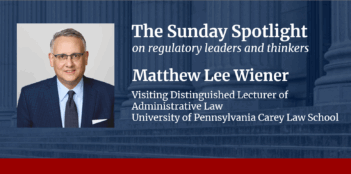
Bill places special emphasis on rules with a high impact on the economy.
Accusing regulations of impeding “economic growth and job creation,” a bipartisan group of members of Congress have introduced a bill, in both the House and the Senate, to place procedural hurdles on agency rulemakings. The bill, the Regulatory Accountability Act (RAA), would significantly amend the Administrative Procedure Act (APA), which governs federal agency actions. Today, the House Judiciary Committee is holding a hearing to consider the proposal.
The RAA would place the most significant procedural hurdles on agency attempts to create rules that would impact the economy significantly. It would require agencies to go through the APA’s formal rulemaking procedures to adopt such rules. It would also heighten judicial scrutiny of such rules, requiring agencies to provide “substantial evidence” to the courts in order for their rules to be upheld.
Right now, agencies can issue rules through an “informal” rulemaking process that merely requires that an agency publish its proposed rule in the Federal Register and allow the public an opportunity to submit comments to the agency. As part of the formal rulemaking requirements the RAA would impose for impactful rules, agencies would also be required to provide hearings with opportunities for cross-examination. The RAA would also require publication of – and make the basis of the required hearings – “all information considered by the agency, and steps to obtain information by the agency, in connection with its determination to propose the rule.”
The bill also requires agencies to publish, for public comment, “advanced notice[s] of proposed rule making” 90 days before they may publish notices of proposed rulemaking of any impactful rule.
For all rules, the RAA would require agency consultation with the Office of Information and Regulatory Affairs (OIRA), within the Executive Office of the President, to determine economic effects. The bill also would provide OIRA with authority to issue guidance for agencies’ cost-benefit analyses and would forbid courts from deferring to agency analyses that do not comport with OIRA guidance.
Agencies would be required to consider, for any rule they propose, the proposed rule’s benefits and “direct, indirect, and cumulative costs” for “jobs, economic growth, innovation, and economic competitiveness.” Agencies would be required to compare the costs and benefits of “[a]ny reasonable alternatives” to the rulemaking, including not acting, rescinding existing rules, and allowing state or local rules to govern.
Although an Executive Order of President Obama (consistent with executive orders dating back to the Reagan Administration) already requires agencies to maximize net benefits when “choosing among alternative regulatory approaches,” it considers as benefits “potential economic, environmental, public health and safety, and other advantages; distributive impacts; and equity.” In contrast, the RAA only includes measures of aggregate growth within the definition of benefits.
The RAA forbids an agency from adopting any rule that is not “the least costly alternative that would achieve the relevant statutory objectives” unless the agency justifies the additional costs and explains how it is protecting a public interest “clearly within the scope of the statutory provision authorizing the rule.”
Sixty major trade groups and other business representatives sent a letter to the members of Congress who introduced the RAA saying they “strongly support[ed]” the bill and “look[ed] forward to working with you on moving it forward.” The letter writers said that, in a time of economic weakness, it was important to ensure that regulations imposed as small a burden as possible.
A number of administrative law professors have strenuously criticized the RAA. Professor Sidney Shapiro of Wake Forest University Law School has written that the bill is “a Christmas tree filled with nearly every shiny proposal that corporate opponents of regulation and their political allies could have ever wished for. It’s designed to hobble regulatory agencies …[and] produce weaker safeguards for health, safety, the environment and more.”
In advance of the House hearing today, a group of over fifty academics and practitioners in the fields of administrative law, regulation, and public administration have written a letter to the Committee “strenuously urg[ing its] rejection of this proposal.” The letter writers criticize the bill for imposing overly burdensome procedural requirements on rulemaking that would delay “ordinary” rulemaking and only cause agencies to avoid the rulemaking process.



